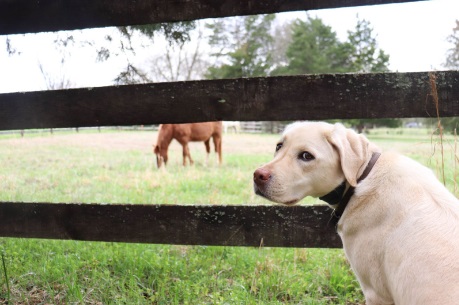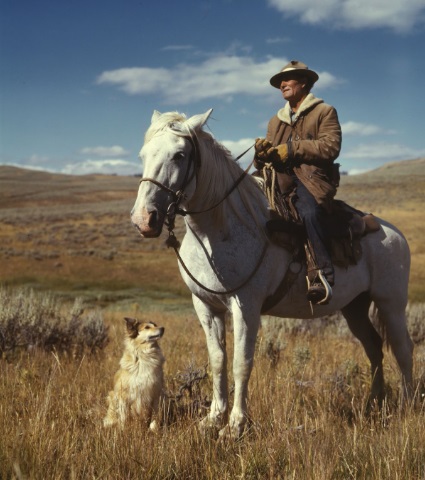Many of you might think of dogs being scared of horses due to their size. However, this is far from the truth, and the opposite could occur.
There is a possibility that a horse could be scared of dogs, and there could be several reasons for it.
Is a horse scared of dogs? If so, why is it scared of dogs? Find answers to all these questions and more about horses and dogs.
Do Horses Get Scared Of Dogs?

Yes, horses get scared of dogs. Although horses are much larger animals than dogs, they still fear dogs.
It could be more so when the horse is unfamiliar with the dog. Sometimes, when a horse and a dog grow together in the same environment, both get used to each other, and the fear reduces.
In most general cases, horses are scared of dogs for several reasons.
Why Is A Horse Scared Of Dogs?
It’s natural and normal for horses to be scared of dogs because dogs are predators. Dogs have a natural tendency to chase horses, which could scare them.
Dogs may appear surprised and excited by seeing a new animal species. They could react differently to this, including showing excitement, fear, and stress.
Some dogs with prey instincts may chase horses, which could scare the horses. Dogs may even bite or attack horses due to this unfamiliarity, excitement, and all other emotions that envelop them.
Why Would A Dog Chase A Horse?
Dogs are descended from a predatory species that hunts animals for food. They were bred to do various things, and some will have more instinctive behavior traits than others. Therefore, these traits depend on the breed of your dog.
Although dogs are kept domestically as pets, their hunting and chasing instincts are mostly present. Dogs that have not seen horses will react with a mixture of curiosity, nervousness, and fear and start chasing the horse or being aggressive toward it.
A dog may even want to play with the horse, but the horse won’t understand this and will start running out of fear.
How To Avoid A Chase Situation?
Here are the steps that you can take to avoid a chase situation.
- Socialize your dog and train it to be calm when amidst horses from an early age. Train it to not think of it as something exciting or scary.
- Have your dog under close supervision and train a reliable call. Keep your dog on a lead if you don’t have a sound recall.
- If you see a horse coming, call your dog and keep still in a visible location.
- Encourage your dog not to bark or growl when it sees a horse approaching.
- Reward your dog’s calm behavior.
- Put a GPS tracker on your dog to monitor its whereabouts. It could prevent your dog from getting too close to the horse. You can use one of the best GPS trackers that work in the UK for optimal results.
How To Introduce Puppies To Horses?
It is best to introduce puppies to horses at a very young age. The best time to do this is between 10 and 16 years of age, which is the critical socialization period.
However, puppies are not fully trained at this age, so it is vital to have a lead to allow more control of what goes on.
You must continue working on obedience training to ensure your puppy is familiar with commands like sit, come, stay, etc. Keep training lessons achievable and positive.
Things To Keep In Mind When Introducing Dogs And Horses For The First Time
Don’t Rush
Introduce your dog to the horse gradually. Your dog may find going to a horse stable for the first time an overwhelming experience. The sights, sounds, and smells may excite it and cause it to bark loudly or jump at the horses.
If this occurs, take your dog away and keep returning until it behaves calmly in front of horses.
Give Clear Commands
A dog should be well-trained on basic commands like sit, stay, and come. Keep training your dog on these commands so that it reacts even in an unfamiliar environment.
Ensure your dog knows which parts of the stable are out of bounds. The paddock is only for horses, so your dog should be able to follow your voice commands and stay away from this area.
Keep A Crate Nearby
Your puppy might be required to stay back at the stable while you are away exercising your horse.
At this point, you should have a crate for your puppy to stay in to avoid getting stamped on or run over by stable traffic.
Body Language
Your dog’s body language should say a lot about how it feels at that point. If your dog appears to be tired, aggressive, fearful, or over-excited, move it from the horse and come back later.
You should also be mindful of the signs that the horse is showing. If it snorts, squeals, or stamps, that means it is afraid or anxious. If so, move your dog from there and there and try introducing each other again when both animals have calmed down.
How To Avoid A Horse Bolting Away From A Dog?
If a horse scares and tries to back off by seeing a dog, this could be dangerous, especially for the rider. The rider wouldn’t have much control over the horse at this point, which could cause harm to the dog, horse, rider, and members of the public in the vicinity.
Here are a few tips to avoid this situation:
- Give dogs a wide berth if they appear to be agitated or nervous.
- Wear bright-colored clothes so that others can see you coming and will move their dogs away.
How To Ride With Dogs And Horses?

Horse riders enjoy taking their dogs with them when they go out for a ride. Having another person with you is ideal if you want to do this.
The other person can take your dog on a lead and keep it from being stamped by the horse and from spooking the horse.
Horses have a blind spot directly behind and in front of them, so chances are that your dog might get under their hooves and are likely to get trodden on.
Final Thoughts
Horses are indeed scared of dogs because dogs are natural predators. However, socializing dogs early on will help them behave calmly in front of horses. It will also help horses eliminate fear and anxiety in front of dogs.
You must gradually introduce your puppy to horses by taking them regularly. If it doesn’t work the first few times, you must keep trying until it does.
Frequently Asked Questions
Do Horses Like Dogs?
Horses naturally fear dogs due to their predatory nature. However, early socializing will help create a strong bond between horses and dogs.
How Do Horses React To Dogs?
Some horses are comfortable around dogs because they were raised together. However, other horses may fear dogs and try to back away due to unfamiliarity.
